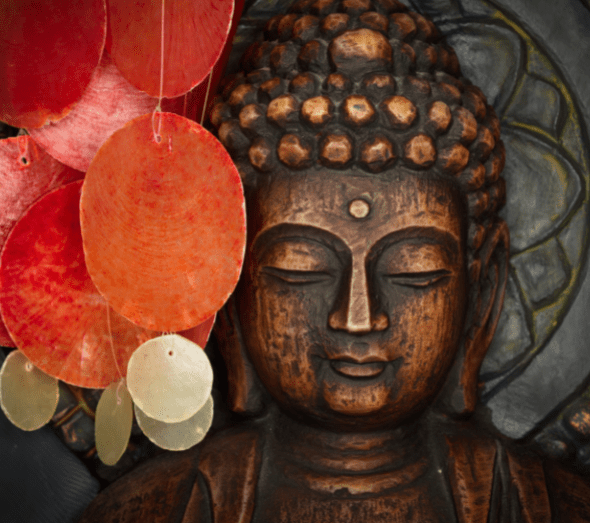Those who practice yoga may be familiar with the idea of sankalp – literally meaning a solemn vow, or a resolution. Because it comes from a deeper yogic space beneath the conscious mind, this becomes an affirmation which silently guides our mind, body and spirit in the direction sought. As the neuroscientist Jill Bolte Taylor says, “Our minds are highly sophisticated ‘seek and ye shall find’ instruments. We are designed to focus inward to find whatever we are looking for.”
Modern physics has discovered that our minds might exert more influence over the world around us than we used to think. The physicist John Wheeler argued for a view that he came to call the ‘participatory universe’: observers participate in creating the reality they measure. Thus a physicist’s decision to measure a particle’s position rather than its momentum changes the objective properties of the real world.
Religious teachers throughout the ages have urged us to pay attention to our intentions — what we would like them to be, and how to go about changing them. As fallible creatures, we all make mistakes. Sometimes we end up causing harm even though our intentions are good. But if we act out of love, the intention supersedes the action and the deed is in consonance with the cosmic order.
Exerting conscious control over our intentions takes practice and time. “It is clear within all traditions, Eastern or Western, that initially our thoughts are not under our direction,” writes the physicist Arthur Zajonc. “Early on and throughout our practice it is, therefore, essential to school our thinking to come more and more under our control.” The neuroplasticity of the brain enables us to change our intentions – and therefore behavior. It is difficult initially but can be achieved with purposeful intent.
There are basic similarities and some differences in the way all religions view intention. In Judaism and Islam, kavana and niyyah are the respective terms for intention. Both are of fundamental importance to these traditions because it is through focused intention toward God that all other spiritual practices like prayer and fasting become religiously meritorious, which is true in Baha’i as well. Similarly, intention in Indian traditions like Hinduism, promotes good karma; intention is the first step in any series of actions, and since actions create chains of cause and effect, one’s intentions can have powerful and long-lasting ramifications.

The eightfold path of the Buddha includes “right intention” as one of its precepts. According to Buddha, the actual action matters less than the intention behind it. The Chinese traditions of Taoism and Confucianism point out that the corruption inherent in human society leads us away from the purer intentions of our true selves. In Taoism, the imposing of the human will and conscious intentions is one of the obstacles to the goal of returning to original simplicity by following natural instincts. In Confucianism, it is ritual practice and a clear set of moral guidelines that helps people to establish proper intention.
The human capacity for powerful positive intentions is limitless. If we choose to set positive intentions and seek what is lovable in others, we will find it easier to love.
Christianity
“For the word of God is alive and active. Sharper than any double-edged sword, it penetrates even to dividing soul and spirit, joints and marrow; it judges the thoughts and attitudes of the heart.”
— The New Testament (Hebrews 4:12), Christian text
Judaism
“These people come near to me with their mouth and honor me with their lips, but their hearts are far from me. Their worship of me is based on merely human rules they have been taught.”
— Hebrew Bible (1 Isaiah 29:13), Jewish text
Islam
“He will not call you to account for oaths you have uttered unintentionally, but He will call you to account for what you mean in your hearts. God is most forgiving and forbearing.”
— The Qur’an (2:225), Muslim text
Baha’i
“One must see in every human being only that which is worthy of praise…Thus it is incumbent upon us, when we direct our gaze toward other people, to see where they excel, not where they fail.”
— ‘Abdu’l-Bahá, Baha’i leader
Hinduism
“Intention is clearly greater than the mind, for it is only after a man has formed an intention that he makes up his mind; after that, he vocalizes his speech — and he vocalizes it to articulate a name. The vedic formulas are contained in the name, and rites, in vedic formulas. Now, intention (samkalpa) is the point of convergence of all these things; intention is their essence (atman); and on intention they are based.”
— Upanishads, collection of Hindu texts
Buddhism
“Karma dictates certain conditions over which we have no control — when and where we are born, for instance — but within that situation we are presented with choices.”
— Yuki Miyamoto, ethicist and scholar of Religion

Daoism
“Your actions produce reactions that follow you like shadows. Just as a tall person’s shadow is tall and a short person’s shadow is short, ugly words will produce ugly echoes, and good intentions will produce good reactions. For every action there is a reaction, and for every cause there is an effect.”
— Lieh-tzu, Daoist text
“There was a man who lost an ax and suspected that the boy next door stole it. For the next few days he watched the boy’s movements and decided his behavior and looks were like those of a guilty person.
Later, the man found the ax in a deserted area in the woods. When he got home, his neighbor’s boy no longer looked like a thief.
”
— Lieh-tzu, Daoist text
Confucianism
“Just desire the good for yourself and the common people will be good. The virtue of the gentleman is like wind; the virtue of the small man is like grass. Let the wind blow over the grass and it is sure to bend.”
— The Analects (12:19), Confucian text


